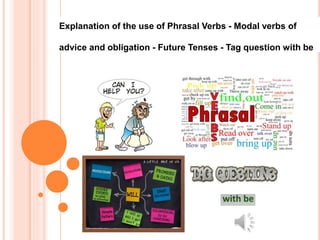
Activity 8 ingles b1 +
- 1. Explanation of the use of Phrasal Verbs - Modal verbs of advice and obligation - Future Tenses - Tag question with be
- 2. PHRASAL VERBS Una frase verbal es una frase de 2 o 3 palabras que funcionan como el verbo principal de una oración en inglés. Las combinaciones son las siguientes: verbo + preposición –> look up (mirar hacia arriba) verbo + 2 preposiciones –> look up to (admirar) verbo + adverbio –> look away (quitar la mirada) verbo + adverbio + preposición –> look away from (quitar la mirada de algo) sustantivo + preposición –> clam up (callarse)
- 3. EJEMPLOS - PHRASAL VERBS He is running away you put in for a new position at the school Get in the car and I will take you to company I arrived at 10 and I checked into the hotel immediately Pablo applied to many universities, but she only got into one.
- 4. MODAL VERBS OF ADVICE AND OBLIGATION Los verbos modales son verbos auxiliares que no pueden funcionar como un verbo principal, a diferencia de los verbos auxiliares “be”, “do” y “have” que sí pueden funcionar como un verbo principal. Los verbos modales expresan modalidad, habilidad, posibilidad, necesidad u otra condición. Estos verbos funcionan de manera distinta a los verbos normales y son usados delante de otros verbos, en coletillas interrogativas (tags) y respuestas cortas.
- 5. Estos verbos modales se saltan algunas normas: 1. no cogen la -S en la tercera persona del singular del presente simple. 2. normalmente usan NOT para la forma negativa; 3. muchos de ellos no existen en el pasado o en el futuro.
- 6. MODAL VERBS OF OBLIGATION Los verbos modales “Have to”, “must” y “should” se usan para expresar que algo se debe realizar por obligación. have to / don't have to: Fuerte obligación (posiblemente desde fuera) must / mustn't: Fuerte obligación (posiblemente basada en la opinión del orador) should / shouldn't: Obligación leve o consejo.
- 7. Ejemplos: Children have to go to school. We had to wear a school uniform when we were a children. He must study today. You must not drink and drive. You should save some money.
- 8. MODAL VERBS OF ADVICE Los verbos modales “should,” “ought to” and “had better” se usan para expresar que algo es una idea buena (o mala). "Should" es la forma más común de dar consejos. Should: Refleja una opinión sobre lo que es correcto. Se traduce como el condicional de “deber” en español. Ought to: “Ought to” es un sinónimo de “should” aunque es menos común. had better: Este es para dar una recomendación o consejo un poco más fuerte. Incluye la idea de una advertencia: algo malo sucederá si no sigues mi consejo.
- 9. Future “Will” Sujeto + “will” + verbo principal. Se usa cuando no existe una conexión implícita o explícita con el presente: Por cosas que decidimos hacer ahora. (Decisiones rápidas) Cuando pensamos o creemos algo sobre el futuro. (Predicción) Hacer una oferta, una promesa o una amenaza. Usas Won’t cuando alguien se niegue a hacer algo. FUTURE TENSES
- 10. Ejemplo: I will buy one for you too. I will arrive late I think it will rain later so take an umbrella with you. I will behave nice next time. My motorbike won't start.
- 11. FUTURE “GOING TO” Sujeto + verbo auxiliar (to be) + “going to” + verbo principal. La estructura BE GOING TO se utiliza normalmente para indicar el futuro, pero con algún tipo de conexión con el presente. Se usa en las siguientes situaciones: Cuando ya hemos decidido o pretendemos hacer algo en el futuro. (Plan prioritario) Cuando hay signos definitivos de que algo va a suceder. (Evidencia) Cuando algo está a punto de suceder.
- 12. Ejemplo: We are going to retire to the forest. He is going to accept the job offer. I think I'm going to faint. She is going to arrive early. The party is going to start.
- 13. TAG QUESTION WITH BE Son las llamadas question tags (preguntas coletillas) a las frases que terminan con otra frase de signo contrario, la cual tiene la intención de pedir la opinión o buscar la aprobación del interlocutor. Para formar esta pregunta corta se utiliza el auxiliar de la frase principal y su sujeto pero de signo contrario. Si no tuviera auxiliar entonces utilizaríamos el auxiliar “to do”. Si la oración es afirmativa, la pregunta coletilla es negativa y viceversa.
- 14. EJEMPLOS: Your sister is younger than you, isn’t she? You can help me, can’t you? Lola is getting married, isn’t she? You can’t sing, can you?
- 15. REFERENCIAS BIBLIOGRÁFICAS http://www.curso-ingles.com http://www.grammar.cl/Notes/Future_Will_vs_Going .htm
